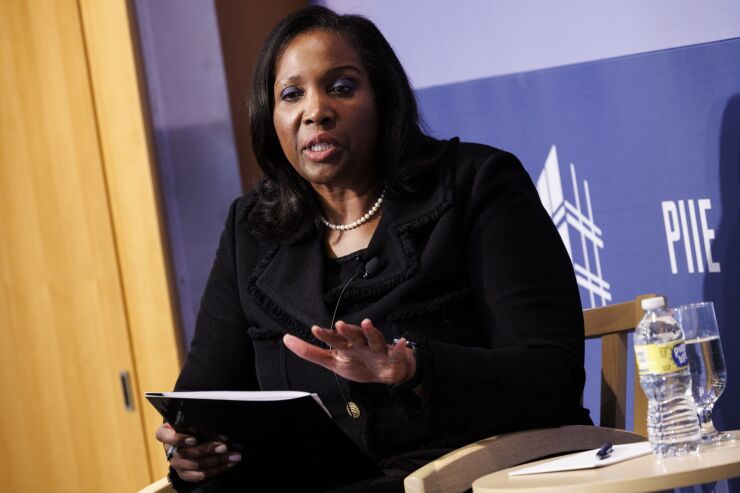WASHINGTON — More interest rate increases are likely needed for inflation to return to 2%, Federal Reserve Governor Lisa Cook said Wednesday, expressing hope that "restrictive" Fed policy can occur without causing economic turmoil.
While inflation has moderated, Cook said it remains "unacceptably high" and requires more action from the Fed, which over the past year has raised the cost of borrowing aggressively in an effort to slow spending and inflation.
"I think we are not done yet with raising interest rates," Cook said at a Joint Center for Political and Economic Studies event in Washington, D.C. "And we will need to keep interest rates sufficiently restrictive to bring inflation back to our target over time."

The comments — which line up with Fed Chairman Jerome Powell's remarks Tuesday that "ongoing increases" will be necessary — come as markets
The Fed has tamped down its aggressive pace of tightening, raising rates by its traditional amount of 0.25% last week rather than its supersized rate increases of last year.
Moving in "smaller steps" is appropriate while "we assess the effects of our cumulative tightening" over the past year, Cook said, noting that the full effect of the Fed's actions on spending often come with a lag.
But economic data are "telling us a pretty clear story right now," she said, noting that the labor market is "historically strong" while inflation remains elevated.
The latest jobs report found the unemployment rate fell slightly to 3.4% in January and employers added a higher-than-expected 517,000 jobs, indicating the job market remains healthy despite fears of a recession. The Consumer Price Index rose by 6.5% in December, far above the Fed's inflation target of 2%.
Bringing inflation back to target will "require maintaining a restrictive policy stance for some time," Cook said, underlining officials' intentions to keep rates high until they're confident inflation is on track to return to 2%.
Rate hikes will likely "unfortunately" mean economic growth will slow and unemployment may rise, Cook said, but a "failure to restore price stability would mean far greater pain" by pushing inflation further.
Still, she said the current strength of the job market makes it more likely that the Fed can bring inflation down "without a large increase in employment."
The central bank's rate hike last week brought its benchmark interest rate to between 4.5% and 4.75%. Fed officials' projections from December indicate they favor raising rates slightly above 5% this year.






